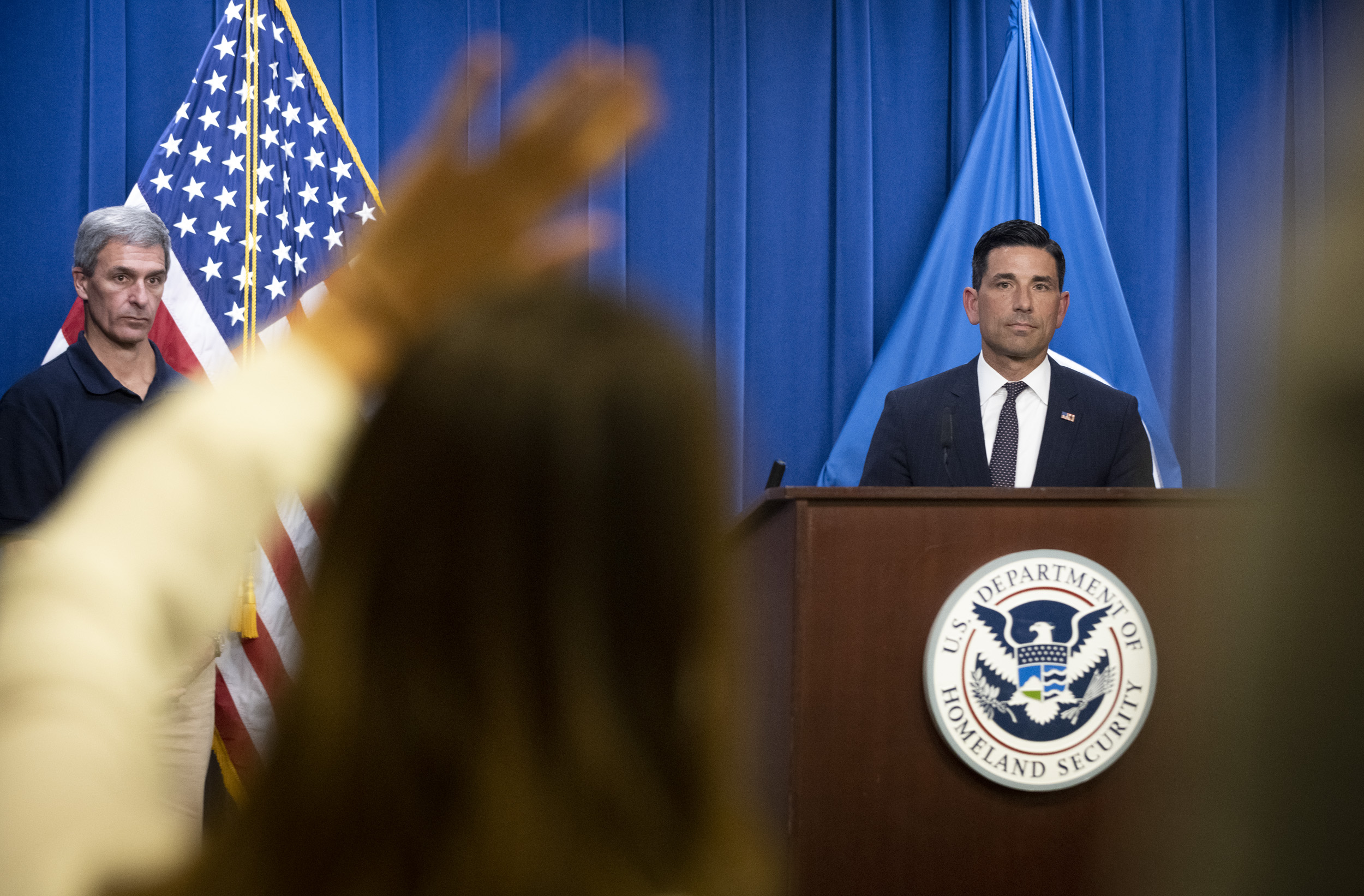So Who Actually IS In Charge of DHS?
Who is running the Department of Homeland Security (DHS) today? Nobody really seems to know.

Published by The Lawfare Institute
in Cooperation With

Who is running the Department of Homeland Security (DHS) today? Nobody really seems to know. Seriously—it is an open legal question.
President Trump is of the view that the current acting secretary of the Department of Homeland Security is Chad Wolf. He gets the job because he was confirmed by the Senate to be the undersecretary for the Office of Strategy, Policy and Plans and his predecessor, Acting Secretary Kevin McAleenan, changed the order of succession at DHS before he resigned, to make Wolf next in line.
The Homeland Security Act says that if the secretary position is vacant, the deputy secretary and the undersecretary for management are second and third in line for the position. But it also provides the secretary with further authority to designate who is third, fourth, etc. in line to be acting secretary of DHS. That’s what McAleenan did in November 2019 before he quit—he changed the order so that Wolf would be third—and since the deputy and undersecretary for management positions have been vacant for a long while (since 2018 and April 2019 respectively) that meant that Wolf would take the title of acting secretary.
But what if McAleenan himself was not really the acting secretary? Would his redesignation of the order of succession be effective?
Those are not idle questions. In fact, to the contrary, they’re issues raised by the general counsel of the Government Accountability Office (GAO), in an opinion that GAO issued today. And his view is that neither McAleenan nor Wolf have legal standing as acting secretary.
It turns out that McAleenan was, himself, named acting secretary in April 2019 after the last Senate-confirmed secretary, Kirsten Nielsen, resigned. Before she quit, Nielsen also used her authority to change the order of succession. She purported to move McAleenan (who was then the commissioner of Customs and Border Protection) up to the third spot and he, in turn, took the title of acting secretary.
But according to the GAO, DHS and Nielsen did it wrong. Talk about malevolence tempered by incompetence.
You see, DHS actually has TWO different lines of succession: One that applies when the Secretary is not available because of death or resignation and another that applies when the Secretary is unavailable due to disaster or catastrophic emergency. For much of its history, though legally distinct (under something known as HSA Delegation 00106) the two lines of succession were substantively identical—that is the same order was listed for both types of succession.
Here’s the problem: In February 2019, before she quit, when Secretary Nielsen changed the order of succession (under HSA Delegation 00106) she only changed the line of succession for disaster or catastrophic emergency. The memorandum she signed left unchanged the order or succession in case of resignation. It’s almost certain that she meant to change both, but the fact of the matter is that she didn’t—and that left the pre-existing order of succession in place.
And that pre-existing order, which was set by Executive Order 13753, set the succession as going (after the deputy and the undersecretary for management) first to the administrator for the Federal Emergency Management Agency (FEMA) and then to the director of the Cybersecurity and Infrastructure Security Agency (CISA). And since in April 2019 when Nielsen resigned the FEMA position was also vacant, that means that under law the true acting secretary at the time was Chris Krebs, the director of CISA.
Or so the GAO concluded. And then, of course, since only the acting secretary has authority to alter the order of succession, it follows that when McAleenan purported to further modify the succession order to put Wolf in line to succeed him, he didn’t have the authority to do so. And, thus, that Wolf is no more lawfully acting secretary than McAleenan was.
And so we come to today. Of course, now we do have a new FEMA Administrator, Pete Gaynor, who has been senatorially confirmed. So, if the vacancy were to happen today, under the still-governing executive order, it seems Gaynor would be the acting secretary. I have no idea—quite literally none—whether the acting secretary ship should be judged by who was in place at the time the vacancy actually occurred (in which case it would still be Krebs) or at the time that it was legally determined to exist (which might be now, and thus Gaynor).
As for what happens next—in a rational world when a court deems an appointment illegal, the executive moves to fix it, and the new appointee attempts to ratify the acts of his illegal predecessor. That’s what happened at the National Labor Relations Board (NLRB) under President Obama. Failing that, it seems likely that any adversely affected party will have a reasonable argument that actions authorized by the illegally appointed acting secretary are de jure invalid and void. This would, I think, apply to the panoply of DHS actions—everything from immigration enforcement directives, to chemical facilities regulations to grant decisions is at risk. And while the GAO opinion will not legally bind any court called upon to determine the issue, it will be persuasive evidence of the illegality of Wolf’s appointment.
In short, the pervasive vacancies at DHS have been a significant practical impediment to its operation, much to the detriment of the American public. Now it appears that those vacancies have created legal impediments as well, further weakening an already disabled agency.




